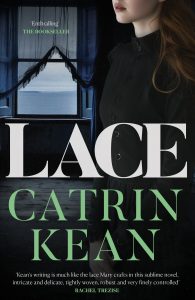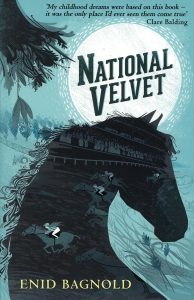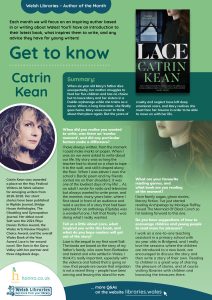Catrin Kean
September 5, 2024
“When six year old Mary’s father dies unexpectedly, her mother struggles to feed her five children and has no choice but to leave Mary and her sisters in a Dublin orphanage while she trains as a nurse. When, a long time later, she finally goes home, Mary vows never to think about that place again. But the years of cruelty and neglect have left deep emotional scars, and Mary realises she must face her trauma in order to be able to move on with her life.”
Congratulations Catrin, and thank you for answering a few questions from Libraries Wales.
Tell us a little about your background… upbringing, education…
I’m the eldest of three children. My mother is a poet and so books were a part of my life from when I was very young, but I didn’t do very well at my comprehensive school, getting very few qualifications and then being asked to leave when I was sixteen. I enjoyed only two things at school – cross country running and English, particularly creative writing. I had a teacher called Miss Calford who loved my writing and really encouraged me.
What memories and influences stand out from your childhood?
One of my earliest memories is coming home from school to find my mother crying. Some children in a school not so far from me had gone to school just like I had, but had not come home, because a huge slag heap had fallen on top of their school: Aberfan. I was five years old and before that I had thought that I was safe, but the idea that you could go to school and a mountain could fall on you was terrifying, and I don’t think I ever felt quite as secure again. I remember clearly listening to adults talking in the kitchen, some of whom had gone to help. I was really impressed by the idea that people could come and help when you were in trouble, even if they didn’t know you.
As a young person, who or what influenced you?
I loved reading as a child but I think the book that really made me want to write was National Velvet by Edith Bagnold. I wrote my own rip-off and rather terrible version when I was 9. I have re-read it as an adult and I still find the language of it so beautiful, as well as the story of a young girl following her dreams. When I was 19 I discovered the writer Violette Leduc in a charity shop and she cemented for me the fact that I wanted to be a writer too. I remember being on a college trip in Paris, and a group of us were on the Metro late at night talking about our ambitions, and I told them I wanted to be a novelist.
What influences you now?
Other writers – too many to mention – though Tony Morrison is probably my favourite writer. I am also influenced by everyday life. I write every day in a journal – just observations and things that come to mind, but I find it really useful to write with no particular goal and no pressure, and that’s often when the ideas come.
When did you realise you wanted to write, was there an ‘eureka moment’, and did any particular factors make a difference?
I have always written, from the moment I could make marks on paper. When I was six we were asked to write about our life. My story was so long the teacher had to stand on a chair to tape it to the wall, and still it draped along the floor. When I was eleven I won the school’s Bardic poem and my friends carried me on their shoulders: it was one of the loveliest days of my life. I won it again when I was fourteen but I didn’t enjoy it then: I felt everyone would think I was a show off. As an adult I wrote for radio and television but always wanted to write prose, and the moment, many years later, where I first stood in front of an audience and read a section of a story that had been selected for an anthology (Riptide) was a wonderful one. I felt that finally I was doing what I really wanted.
Tell us a little about Lace, what inspired you write this book, and what do you hope readers will get out of the story?
Lace is the sequel to my first novel Salt. The books are based on the story of my father’s family, who were from Barbados and Ireland and who settled in Wales. I think it’s really important, especially with the violence and hatred that is going on now, that people are aware that migration is not a recent thing – people have been arriving and leaving this island for ever.
What are your favourite reading genres, and what book are you reading at the moment?
I love family sagas, ghost stories, literary fiction. I’ve just started reading Archipelago by Monique Roffey. I loved The Mermaid Of Black Conch so I’m looking forward to this one.
In what way have libraries influenced you during your lifetime?
When I was a child we went to the library every Saturday. I loved sitting in the children’s area browsing a new book. I have often written in libraries too – it’s really inspiring to work surrounded by books.
Do you have suggestions of how to encourage children and young people to read more for pleasure?
I work as a one-to-one teaching assistant in a primary school with six year olds in Bridgend, and I really love the sessions where the children are introduced to a new book, are encouraged to discuss the story and then write a story of their own. Reading to children is a great way of sharing the pleasure of stories, and of course visiting libraries with children and browsing the treasures there.
Do you have a quote that inspires you?
It would have to be Sappho’s ‘Someone in another time will remember us.’ Because stories preserve memory.
Thank you Catrin.
Lace was published in July by Gwasg Honno Press.
Read our Get to Know the Author flyer and take a look at our previous Authors of the Month writing in English.




